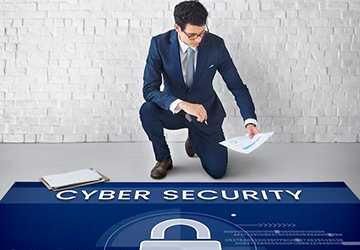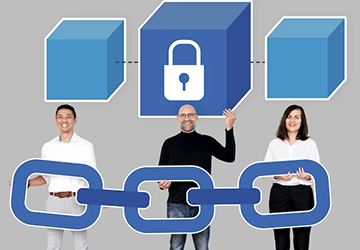Let's start by exploring Cybersecurity 101, the cornerstone of digital safety. These elementary rules and guidelines form the basis of all cybersecurity efforts. Knowing the basics isn't just for IT professionals; it’s necessary for anyone interacting with digital platforms. Cybersecurity doesn't begin and end with antivirus software; it encompasses a broader range of practices designed to protect individual users and large-scale systems.

Moving on to Cybersecurity Fundamentals, secure passwords are the first defence against unauthorised access. Surprisingly, many people still need to pay more attention to the importance of this primary security measure. In today's world, creating strong and unique passwords for different accounts isn't just recommended. It's crucial. Multi-factor authentication (MFA) adds another layer of security and is fast becoming a standard security measure across multiple platforms.
Understanding Cybersecurity is only complete when delving into the realm of network security. As Wi-Fi networks become ubiquitous, securing your home and work networks is more critical than ever. A strong firewall is an essential part of this process. But remember, security measures like firewalls and network passwords are only foolproof if complemented by regular software updates.
Speaking of software updates, this is an often overlooked yet vital part of Cybersecurity Fundamentals. Software updates aren't just about adding new features; they often contain patches that fix security vulnerabilities. Neglecting to update your software can open your systems to attacks that exploit these vulnerabilities.
Lastly, Understanding Cybersecurity is an ongoing process. The cybersecurity landscape is constantly changing, with new threats emerging regularly. Being proactive about educating yourself on the latest security threats and protective measures is vital. Subscribe to reliable sources of information and consider formal training to keep your cybersecurity knowledge up-to-date.
Employee training in Cybersecurity needs to be played more, yet it holds immense value in building a secure organisational framework. Understanding Cybersecurity is a task that extends far beyond the responsibilities of the IT department. Every individual within an organisation has a role to play. Phishing scams, for instance, frequently target employees who need to be better versed in identifying such attacks. When an unsuspecting employee clicks on a malicious link, they can inadvertently expose the entire network to risks. Therefore, regular training sessions every quarter can significantly lower the probability of a successful cyberattack. These sessions can equip employees with the skills to recognise threats and act swiftly to neutralise them.
When establishing a secure digital environment, conducting regular audits is an often overlooked yet critical aspect. These audits, which should be a staple in your Cybersecurity Fundamentals, serve multiple purposes. They identify potential vulnerabilities in the software and hardware and review organisational practices. The audit process should evaluate whether current practices align with legal requirements and sector-specific best practices. The outcome of these audits often provides a roadmap for enhancing security protocols, thus safeguarding valuable data and resources from potential cyber threats.
Data is an invaluable asset in today's digital age. The loss of essential data can be catastrophic, often bringing businesses to a standstill. That's why a secure backup solution is not just an option but a necessity in Cybersecurity 101. Leveraging advanced automated backup solutions ensures that your valuable data is securely stored in an off-site location, thus offering protection against a wide array of cyber threats, including ransomware. Most contemporary backup solutions also provide encryption features, which add an extra layer of security to protect sensitive information.
Cybersecurity is an ever-evolving field that demands constant updates and adaptations. The Importance of Cybersecurity will continue to grow as we become more reliant on digital systems. Businesses that aim to remain secure must adopt a proactive approach. Cybersecurity involves investing in the latest cybersecurity technologies, such as Artificial Intelligence (AI) and machine learning algorithms. These emerging technologies play a transformative role in predictive threat modelling, a future-focused aspect of Cybersecurity aimed at anticipating risks before they become a real problem.

In the same way, you would only go weeks without brushing your teeth; good cyber hygiene should be addressed. Understanding Cybersecurity also involves comprehending the importance of maintaining a clean and secure digital environment; this goes beyond having solid passwords. It includes updating software regularly, ensuring your network is secure, and being cautious when downloading files from the internet. A single employee's bad cyber hygiene can compromise the entire network in a business setting. Hence, maintaining good cyber hygiene should be a part of every organisation's cybersecurity policy.
Often, when we discuss Cybersecurity Fundamentals, the role of encryption in safeguarding data privacy needs to be stressed more. Data encryption is not just for the IT department but is something every employee should be familiar with. Encryption should be standard practice for any sensitive information stored or transferred digitally. In the case of a data breach, encrypted data will remain unreadable and useless to cyber criminals; this can be crucial in limiting the damage caused by any potential cyber-attacks.
As businesses grow, so do the number of points that could be exploited in a cyber attack. One emerging trend in Cybersecurity 101 is the adoption of decentralised security models. In this setup, rather than having a single point of security, multiple nodes or departments have their security protocols; this can significantly slow down or halt cyber attacks since compromising one.
While much of the cybersecurity focus is on technology, the human element is often the weakest link. Employees can be manipulated into revealing sensitive information through social engineering tactics. Addressing the human factor becomes more critical as the Importance of Cybersecurity rises.